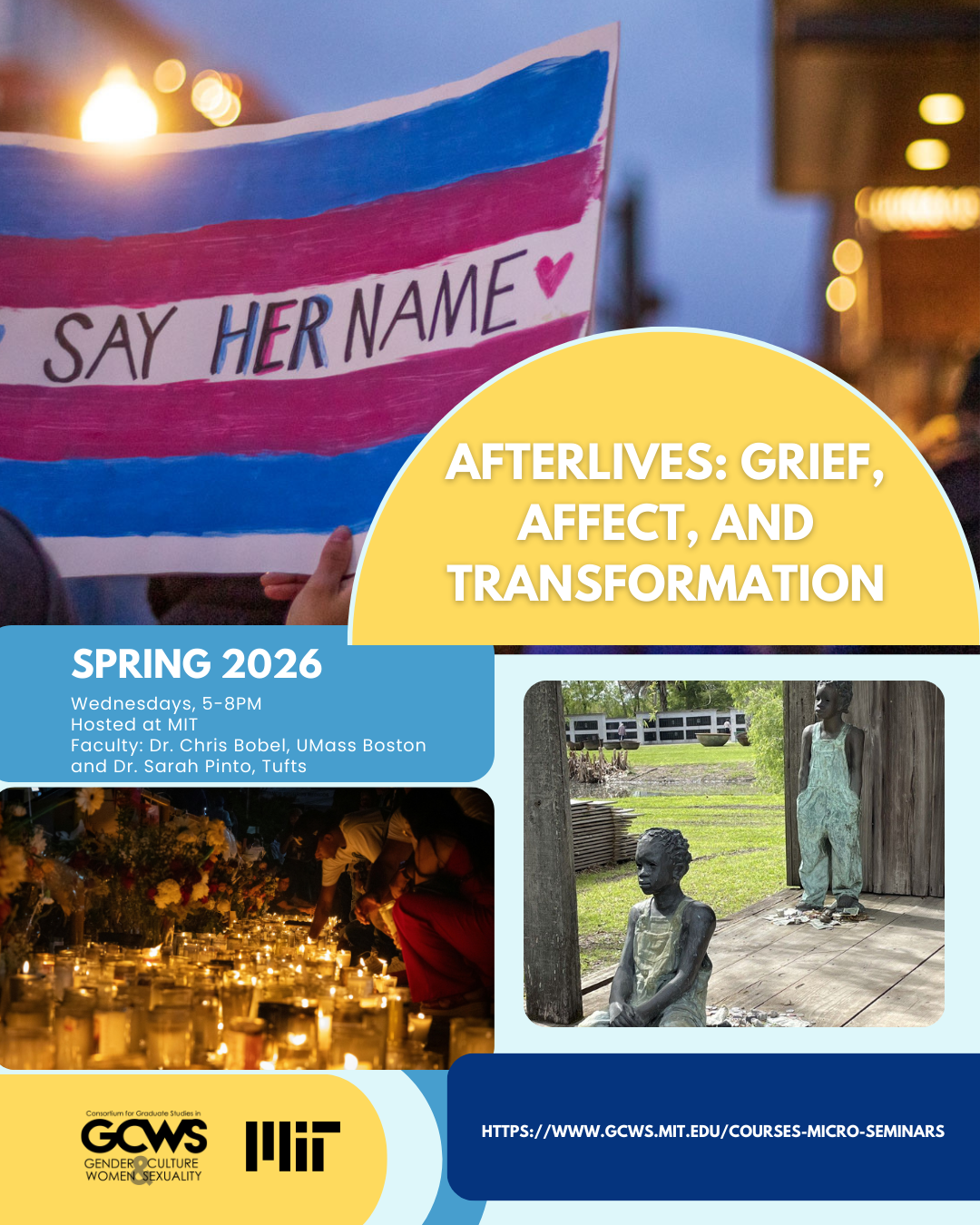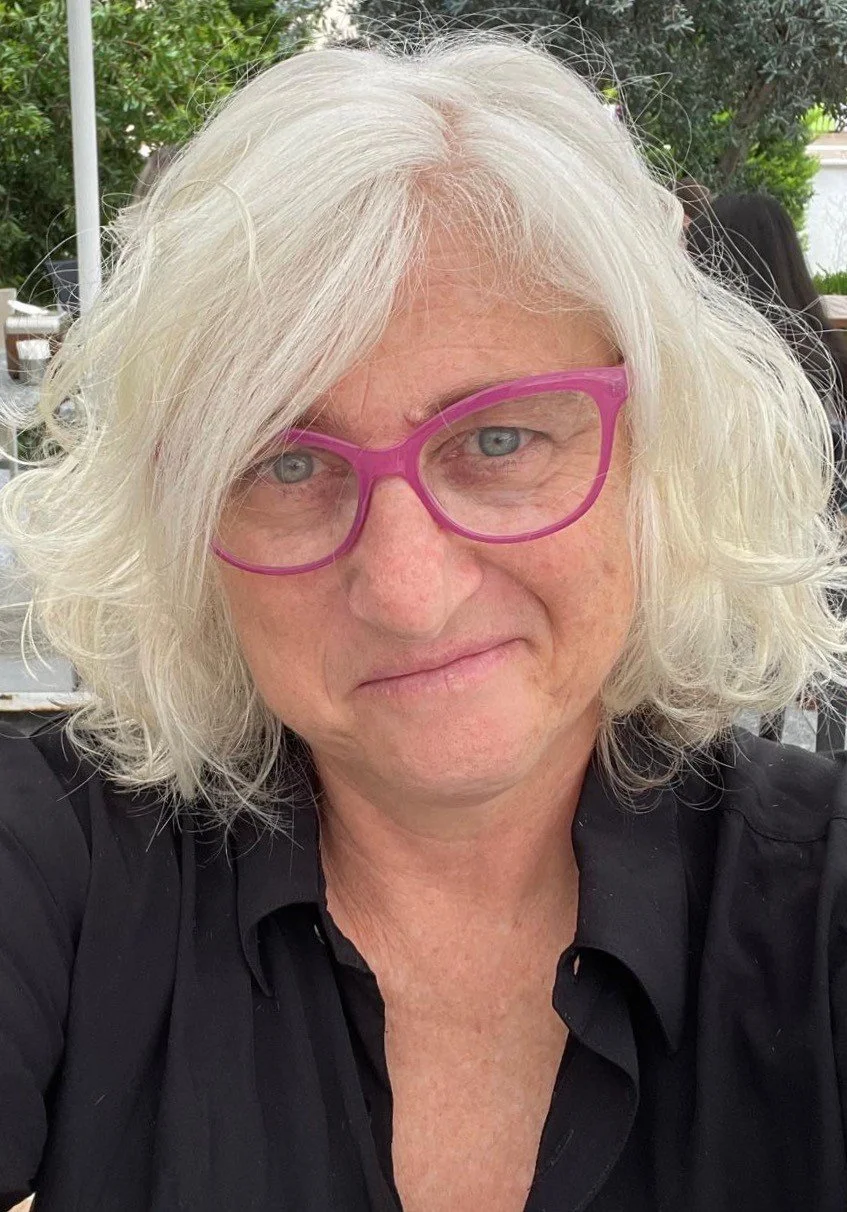Spring 2026, Wednesdays, 5:00-8:00PM; MEETs AT MIT
In this seminar, we consider the social life of grief. We are especially interested in the feminist uses and understandings of emotions related to trauma and loss, including rage, sorrow, and resignation, among a wide range of feelings.
Considering the cultural and political dynamics of what Ann Cvetkovich calls “public feelings,” we will ask, How do emotional expressions, so often assumed to be a private, personal experiences, emerge intersubjectively in gendered conditions? How might they influence social movement work and other efforts to seek justice, and how might they shape, and be shaped by forms of social belonging, exclusion, and intimacy?
Faculty
Chris Bobel (she/her/hers) is a Professor of Women's, Gender & Sexuality Studies at the University of Massachusetts Boston. During 2024-25, she served as a Fulbright Senior Lecturer in the Gender Studies Program at Kadir Has University in Istanbul. Chris explores the hidden, shamed, and misunderstood aspects of human experience through the lens of social movements, gender, health, emotions and embodiment.
For the last 2 decades, Chris has been a pathbreaking scholar of menstrual activism, exploring how menstrual health is a matter of both human rights and reproductive justice. As past president of the Society for Menstrual Cycle Research and frequent media consultant on menstrual activism, Chris unites feminist thinking with feminist doing. Her major publications in this area include New Blood: Third Wave Feminism and the Politics of Menstruation and The Managed Body: Developing Girls and Menstrual Health in the Global South (winner of the 2020 Outstanding Book Award from the American Sociological Association). Her co-edited open-access Palgrave Handbook of Critical Menstruation Studies has been downloaded nearly 3 million times worldwide. Chris is also co-editor (with Samantha Kwan) of Body Battlegrounds: Transgressions, Tensions, Transformations and Embodied Resistance: Challenging the Norms, Breaking the Rules.
Chris's newest research emerged from profound personal loss: the death of her teenage daughter which led her to grief and death studies. She’s completing her seventh book, Accidental Activism: Surviving Traumatic Loss with Purpose, Connection & Community (NYU Press). The book weaves together interviews with grieving activists and her own journey, showing how (and why) trauma can spark social change.
Currently, Chris serves as Book Review editor and is co-editing a special issue on "Feminism, Antifeminism and the Mobilization of Regret” with Laura Green, both for Signs: Journal of Women in Culture and Society. When she's not researching, writing, or teaching, Chris enjoys traveling, biking, creating (admittedly bad) art, and marveling at her adorable senior cat, Fuzzy.
Sarah Pinto is a Professor of Anthropology at Tufts University, and an affiliate faculty of the Program in Women's, Gender, and Sexuality Studies at Tufts. Her work addresses the ways medical practices intersect with kinship, gender, and love, with an emphasis on questions of power, ethics, and creativity as they become part of the ways people make their way through difficult worlds. She has conducted most of her research in India and in dialogue with South Asian feminists, medical practitioners, and scholars, and she is methodologically interested in work that brings historical considerations to anthropology, and vice versa.
Sarah is the author of Where There Is No Midwife: Birth and Loss in Rural India (Berghahn 2008), Daughters of Parvati: Women and Madness in India (University of Pennsylvania Press 2014) and The Doctor and Mrs. A: Ethics and Counter-Ethics in an Indian Dream Analysis (Women Unlimited 2019/Fordham University Press 2020), and articles on a wide range of topics (sexuality, religion, film, ghosts, quacks, scandals, drugs, speech...).
Sarah is working on two books. Hysteria, Avatars, and Others: South Asian Histories of a Medical Idea is a long-durée history of the medical concept "hysteria" in South Asia. Wife-houses, Female Husbands, and the Structure of Gender, is a theoretical consideration of the idea of gender as formed through relationships and structural arrangements rather than fixed identities. Her current ethnographic research focuses on end of life practices and palliative care in Kolkata, India.
Sarah was a Fulbright-Nehru Distinguished Scholar at Presidency University in Kolkata (2023-24) and her research and writing have been supported by the American Council of Learned Societies, Radcliffe Institute for Advanced Study, the American Institute of Indian Studies, the Social Science Research Council, and Tufts University.



